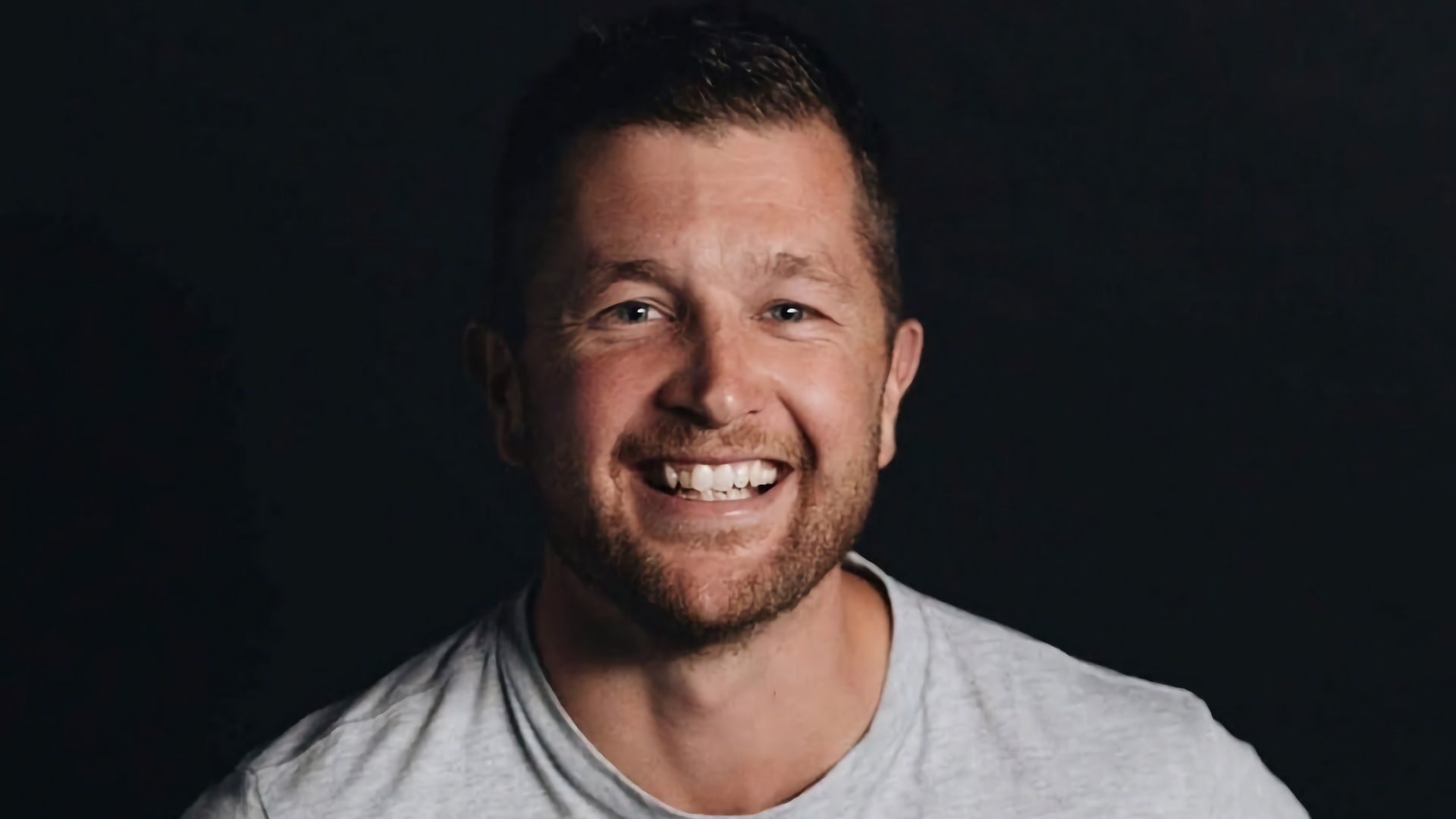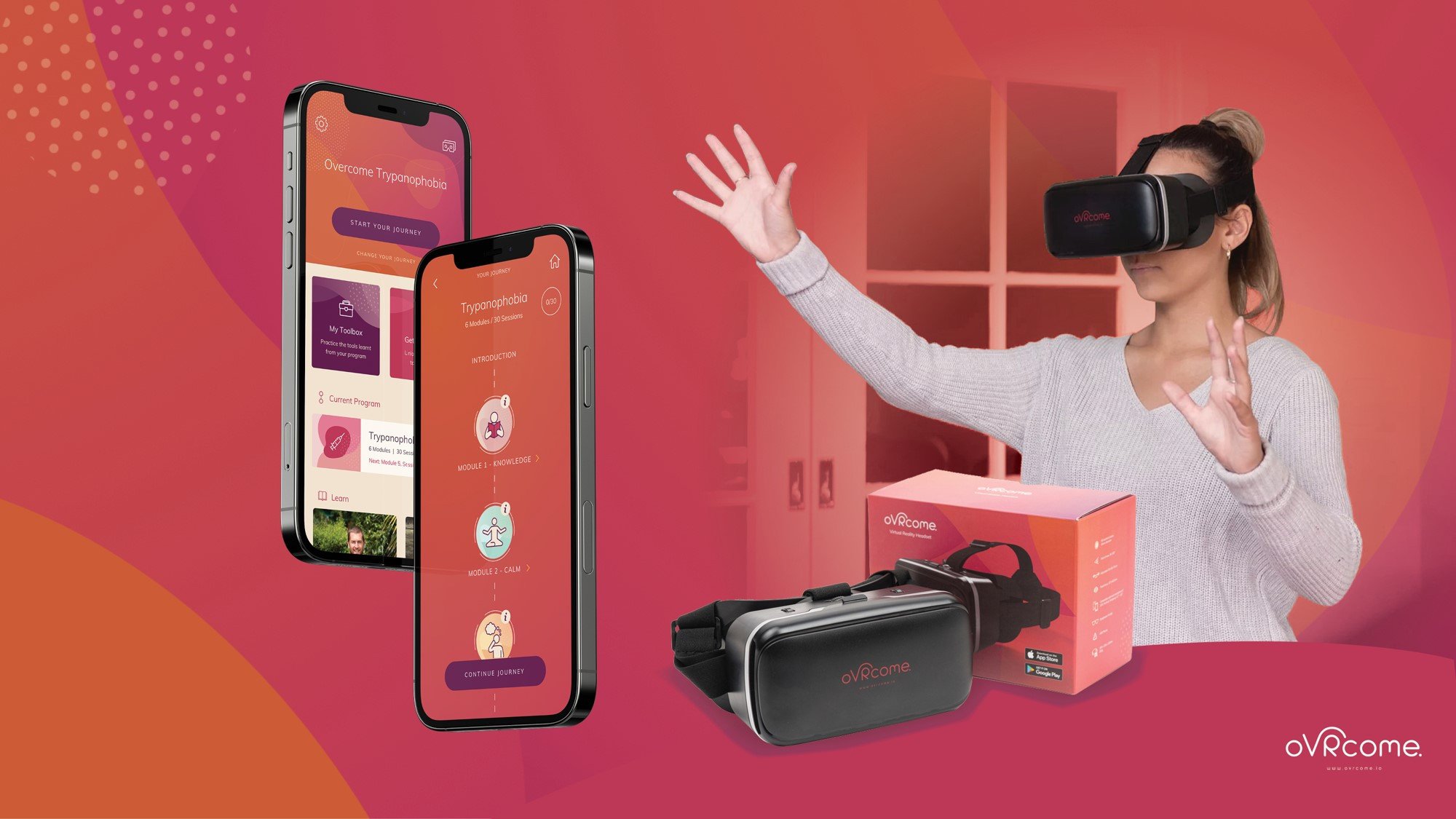What is oVRcome?

oVRcome is a mental health start up established by Adam Hutchinson with the goal to use technology in innovative ways to make clinically proven mental health treatment more accessible. oVRcome provides evidence based VR exposure therapy targeted for anxiety conditions such as phobia’s or social anxiety.
While Adam is based in Ōtepoti, his remote-based team of 9 work alongside Adam to bring this start-up to life. And alive their oVRcome app is now delivering VR exposure therapy in over 30 countries. They have also been busy with a clinical trial with Otago University with results published July 2022. They have 3 more trials planned in 2023. While it hasn’t been an easy road to get to this point, it seems Adam and his highly-valued team have managed against the odds to get their feet firmly on the ground now and are growing forward with steady momentum.
oVRcome is an app that utilises VR technology to support people to reduce their mental distress from anxiety and phobia’s. This year they will trial their programmes on social anxiety, mild depression and panic disorder. The innovation in this start-up comes not only from using VR technology for this purpose but more specifically Adam and the team chose to target the smartphone to provide VR exposure therapy so that oVRcome is more widely accessible and can have more positive impact. Where a VR Oculus can cost a user close to 1000NZD, by reverting to the older smartphone version of VR tech, oVRcome is able to better achieve its goals to lower barriers to treatment, reduce stigma and make the therapy as affordable and accessible as possible.
100NZD will get you a basic VR headset and 6 weeks access to your selected oVRcome programme. All a user need do is sign up, download the app and your ready to go from the comfort of your own home. When there is a wait time of 13-17weeks to see a therapist in NZ currently, oVRcome is providing a much needed treatment option that gives immediate support with no waitlist and provides specialised support for specific phobia’s. Many clinical therapists don’t necessarily have the specific training or experience to provide this targeted support.
Results from their trial were affirming. Based on 126 user’s they found there was a 75% reduction in the severity of user’s experiences’ of their phobia over the 6 weeks. Those results sustained a reduced severity for user’s out to 3-6months. The trial also confirmed that it was a scalable product.
oVRcome sells direct to consumer through online engagement and before any marketing campaign has even happened they are shipping to over 30 countries. There is obvious demand for this therapeutic support. Currently the app is in English only but Adam tells me they are working on developing cultural content and language options built into personalisation algorithms for user’s.
The challenges to oVRcome and innovators in mental health spaces
The big challenges in developing this innovative, clinically evidenced mental health therapy as an option are primarily systemic; appropriate investment and the on-going barriers within primary health care systems to engage these treatment options and support access for NZ’ers to this VR exposure therapy are the biggest obstructions. This is not new information, and while they are common issues, it is useful to gather insight from Adam’s unique perspective.
While Angel Investors has given Adam just enough financial resource to action each small iteration in developing oVRcome what he really knows they need is an investor willing to invest in the unique landscape of mental health. Growing around 30%/month, expanding with BtoB channel for
psychologists, Adam is continually focussed on ‘extending the runway so they can continue doing what they are doing’ while building a good investment case for the right investor. Finding that ‘right’ investor is obstructed by the common metrics used by VC’s (venture capitalists) around start-ups, Adam shares. These metrics design the lens which evaluates and judges whether your start-up idea is fundable or not. These metrics are based on general business metrics focused predominantly around revenue which conflict with the goal of making mental health treatment more accessible and affordable, rather then profit-orientated.
There is obviously a fundamental misalignment between the investors entrepreneurial profit-making priority and purpose and a health start-up which is more purposed to the priority of providing the services required to meet the needs of the people and a healthy society. This on-going clash between neoliberal capitalism’s priorities for endless growth and profit and the social and cultural needs of people and societies is not more felt then in the realities of health, and in this case the mental health of the members of our society.
Being able to provide access to a therapy option such as oVRcome through our primary healthcare system proves to be a hard, if not impossible road. Trying to get such a product into the public health network so that what oVRcome is providing is promoted by GP’s for example is not worth attempting, Adam reflects, as trying to navigate the barriers is too time consuming and obstructs the start-up progressing. These barriers put a lot of mental health innovators and start-ups off trying. In Adam’s case going direct to customer has been the only option and means for oVRcome they don’t need to rely on this access to move forward.
While it is great oVRcome have found a way for themselves forward, it does raise a bigger question around why our primary healthcare systems continue to function in limiting and restrictive approaches that are perpetuating gaps in services that fail to meet the needs of people? Adam identifies further how NZ primary healthcare system tends to be risk-adverse in terms of adopting technology in health in comparison to his experience with NHS, England’s primary health service, who are not. Adam was set to fly off to England for meetings the day of this interview as NHS is keenly proactive in working with innovators to reduce their waiting lists and develop their services and are working with oVRcome right now.
Here in NZ there is the on-going perception and experience of resistance or conservatism around tech and engaging with innovative approaches to reducing mental distress. When I asked Adam whether he could have impact in changing this he was clear that he doesn’t have time to take on changing the system when he has his hands full developing this start up. It seems that it is our own healthcare system that is the major obstruction in providing solutions to its own crisis situation and its not helping itself or the public it is there to serve.
Providing technical support internationally is also a hefty challenge at oVRcome as they develop the app and is something they can only respond to as issues arise and they learn what solutions are needed. They are continually learning at oVRcome. As Adam says several times though, this is the start-up he chose to do and so he accepts these technical challenges just as part of the process.

An innovators insight around walking their talk around wellbeing
Its a grounded acceptance of the challenges that come when leading a start-up that provides solid foundation for another challenge Adam faces in heading a mental health start-up, that of his own wellbeing.
While cognisant of the highs and lows that come with developing a start-up from his previous venture building a tourism start-up, Adam approaches his wellbeing through an attitude of acceptance and through gratitude for his team and the purposed connection that fuels them all. The comfort of also being able to recognise what is happening at any stage in the process and the impact of any challenges is useful to stay grounded and helps with being able to accept the nature of challenges involved helps diffuse stress and pressures. “I know there will be lows and that these will pass and something new will come along and pick things up again”, he has done this before and so he tries not to get stuck in the process, instead just keeping open and keeping going.
Adam also finds opportunity in how he can respond. For example Adam puts personal pressure on himself towards his investors because he knows he is spending other people’s own money. How he has chosen to manage this priority and pressure is to provide monthly updates to his investors which in turn has the positive impact of building stronger and more personal connectivity between investors and oVRcome as it develops. But that is not all, it also gives Adam the opportunity of a regular practice of reviewing and updating progress of his start-up which in turn helps support his ongoing strategic thinking and planning, while also documenting this process of building oVRcome. Finding and multiplying the opportunity in any effort taken maximises his use of time and reduces pressure.
Lastly Adam recommends for innovators to solve something your passionate about as the passion helps fuel you to ride the rollercoaster and get through the lows. Valuable advice drawn from his own experiences provides the reader with some important reminders when it comes to innovation in mental health
